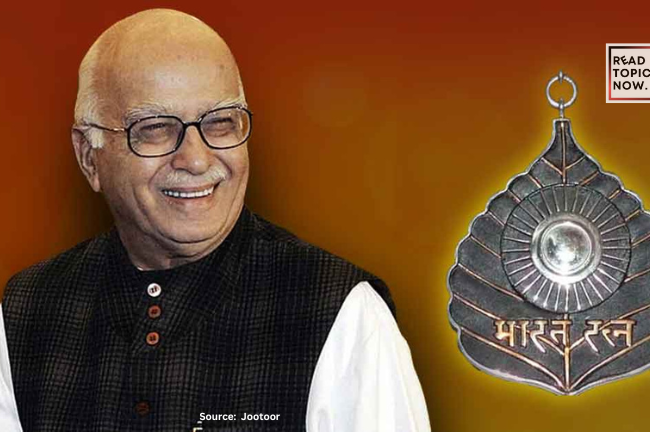
Who is Shri L. K. Advani| BJP| Bharatiya Janata Party | Biography & Facts

Who is Shri L. K. Advani
Shri L.K. Advani is a prominent Indian politician and a founding member of the Bharatiya Janata Party (BJP). He was born on November 8, 1927, in Karachi, British India (now in Pakistan). Advani played a key role in popularizing and strengthening the BJP, which emerged as a significant political force in India.
Life Highlights
- Advani joined the Rashtriya Swayamsevak Sangh (RSS) in 1941 at the age of 14 and became the secretary of its Karachi unit in 1947.
- He studied at St. Patrick’s High School in Karachi and D.G. National College in Hyderabad, Sindh. After the partition of India, he migrated to Bombay (now Mumbai) and completed his law degree from the Government Law College, Bombay University.
- Advani served as a member of the Rajya Sabha (upper house of India’s parliament) from 1970 to 1989, representing Delhi.
- He was the President of the Bharatiya Jana Sangh (BJS) from 1973 to 1977 and later became a founding member of the BJP in 1980 after the collapse of the BJS.
- Advani served as the Deputy Prime Minister of India from 2002-2004 in the BJP-led coalition government. Atal Bihari Vajpayee was the Prime Minister at that time.
- He was the longest-serving Home Minister, serving from 1998 to 2004, and the longest-serving Leader of the Opposition in the Lok Sabha.
- Advani ran as the BJP’s prime ministerial candidate in the 2009 general election but lost. In 2019, he chose not to contest the Lok Sabha elections and left office later that year.
Achievements
- Lal Krishna Advani: Senior BJP leader and former Deputy Prime Minister Lal Krishna Advani was honored with Bharat Ratna on Sunday (31 March 2024). President Draupadi Murmu visited Advani’s residence and honored him with Bharat Ratna Award.
- Advani is credited with popularizing and strengthening the BJP, which emerged as a significant political force in India under his leadership.
- He played a key role in the Ram Janmabhoomi movement, which culminated in the construction of the Ram Temple in Ayodhya.
- As Home Minister, Advani abolished press censorship, repealed all anti-press legislation enacted during the Emergency period, and institutionalized reforms to safeguard the freedom of the media.
- He was awarded the Padma Vibhushan, India’s second-highest civilian award, in 2015.
Advani’s Role in the Rise of the BJP and His Contributions to Indian Politics
Lal Krishna Advani, fondly known as “Loh Purush” (Iron Man), has been a pivotal figure in the rise of the Bharatiya Janata Party (BJP) and its transformation into a dominant political force in India. His strategic vision, organizational skills, and unwavering commitment to the party’s ideology have been instrumental in shaping the BJP’s trajectory over the past four decades.
Advani’s political journey began in the 1940s when he joined the Rashtriya Swayamsevak Sangh (RSS), a Hindu nationalist organization. After the partition of India, he migrated to Bombay (now Mumbai) and actively participated in the activities of the Bharatiya Jana Sangh (BJS), the precursor to the BJP. In 1973, Advani became the president of the BJS and played a crucial role in expanding the party’s base across the country.
One of Advani’s most significant contributions to the BJP’s growth was his ability to forge alliances with like-minded parties and individuals. He recognized the importance of building a broad-based coalition to challenge the dominance of the Indian National Congress (INC) party. Under his leadership, the BJP formed successful alliances with regional parties, such as the Telugu Desam Party (TDP) and the Shiv Sena, which helped the party gain a foothold in various states.
Rath Yatra
Advani’s political acumen and communication skills also played a vital role in the BJP’s rise. He was known for his ability to connect with the masses and articulate the party’s vision in a clear and compelling manner. His famous “Rath Yatra” in 1990, a nationwide tour aimed at mobilizing support for the construction of a Ram temple in Ayodhya, was a watershed moment in the BJP’s history.
The yatra not only raised awareness about the party’s core issues but also helped to consolidate its support base among the Hindu electorate.
Another key aspect of Advani’s contribution to the BJP’s growth was his ability to adapt to changing political circumstances. He recognized the need for the party to evolve from a regional force to a national player capable of forming governments at the center. Under his leadership, the BJP embraced a more inclusive and moderate approach, shedding its image as a party of hardliners and reaching out to a wider section of the electorate.
Advani’s role in the BJP’s rise to power in the late 1990s cannot be overstated. As the party’s prime ministerial candidate in the 1999 general election, he led the BJP-led National Democratic Alliance (NDA) coalition to victory, forming the government under the leadership of Atal Bihari Vajpayee.
Deputy Prime Minister and Home Minister
During his tenure as Deputy Prime Minister and Home Minister, Advani implemented several key reforms and initiatives that strengthened the party’s position and enhanced its credibility among the masses.
Despite the BJP’s defeat in the 2009 general election, Advani’s legacy continues to shape the party’s trajectory. His emphasis on ideological consistency, organizational discipline, and political pragmatism has become the hallmark of the BJP’s success.
As the party continues to dominate the Indian political landscape, Advani’s contributions to its rise and the shaping of India’s political discourse remain a testament to his enduring influence and vision.
Advani’s Involvement in the Ram Janmabhoomi Movement
Lal Krishna Advani’s role in the Ram Janmabhoomi movement, which culminated in the construction of the Ram Temple in Ayodhya, is considered one of the most significant and controversial chapters in his political career.
As a prominent leader of the Bharatiya Janata Party (BJP), Advani played a pivotal part in mobilizing support and raising awareness about the party’s demand for the construction of a Ram temple at the disputed site in Ayodhya.
The Ram Janmabhoomi movement gained momentum in the late 1980s, with the BJP and its allies asserting that the Babri Masjid, a 16th-century mosque, was built on the birthplace of the Hindu deity Lord Ram. Advani emerged as the face of the movement, leading a nationwide “Rath Yatra” (chariot procession) in 1990 to garner support for the construction of the Ram Temple.
The Rath Yatra, which started from Somnath in Gujarat and culminated in Ayodhya, Uttar Pradesh, was a strategic move by Advani to mobilize the Hindu electorate and put the Ram Janmabhoomi issue at the forefront of the national political discourse.
The yatra, which drew massive crowds along the way, helped to consolidate the BJP’s support base and contributed to the party’s rise as a major political force in the country.
Ram Janmabhoomi
Advani’s involvement in the Ram Janmabhoomi movement was not without controversy. The culmination of the Rath Yatra in Ayodhya led to the demolition of the Babri Masjid by Hindu activists in 1992, an event that triggered widespread communal violence and riots across India. Advani was accused of inciting the mob and was charged with criminal conspiracy, though he was later acquitted by the courts.
Despite the controversy and the criticism he faced, Advani remained steadfast in his commitment to the Ram Janmabhoomi cause. He continued to advocate for the construction of the Ram Temple, even as the issue became a subject of legal and political battles.
Advani’s unwavering stance on the issue, coupled with his ability to mobilize the Hindu electorate, cemented his position as a prominent leader within the BJP and the broader Hindu nationalist movement.
The construction of the Ram Temple in Ayodhya, which was completed in 2023, is seen by many as a testament to Advani’s perseverance and the BJP’s long-standing commitment to the issue. While the movement and its aftermath remain a subject of intense debate and scrutiny, Advani’s role in shaping the political discourse and the BJP’s rise to power cannot be overlooked.
Advani’s Tenure as Deputy Prime Minister and Home Minister
Lal Krishna Advani’s tenure as the Deputy Prime Minister of India and the Home Minister in the Bharatiya Janata Party (BJP)-led National Democratic Alliance (NDA) government from 2002 to 2004 was a significant chapter in his political career and the history of Indian politics.
As the Deputy Prime Minister, Advani played a crucial role in the NDA government, serving as a key advisor to Prime Minister Atal Bihari Vajpayee and helping to shape the government’s policies and decision-making.
During this period, Advani was instrumental in strengthening the BJP’s position within the coalition and ensuring the smooth functioning of the government.
Advani’s most significant contribution, however, came during his tenure as the Home Minister. As the longest-serving Home Minister in India’s history, Advani implemented several key reforms and initiatives that had a lasting impact on the country’s security and governance.
Abolition of Press Censorship
One of Advani’s notable achievements as Home Minister was the abolition of press censorship and the repeal of all anti-press legislation enacted during the Emergency period in the 1970s. This move was widely praised as it helped to safeguard the freedom of the media and strengthen the democratic institutions in the country.
Advani also played a crucial role in the implementation of the National Security Guard (NSG) and the National Investigation Agency (NIA), which enhanced India’s counter-terrorism capabilities and improved the coordination between various law enforcement agencies.
These initiatives were particularly significant in the aftermath of the 2008 Mumbai attacks, as they helped to strengthen the country’s response to terrorist threats.
Furthermore, Advani’s tenure as Home Minister saw the introduction of several reforms aimed at improving the efficiency and transparency of the criminal justice system.
He pushed for the modernization of police forces, the establishment of specialized crime investigation units, and the implementation of community policing initiatives.
Criticism
Advani’s tenure as Home Minister was not without its challenges, however. He faced criticism for his handling of the 2002 Gujarat riots, which resulted in the loss of hundreds of lives. The allegations of his involvement in the riots and the subsequent legal proceedings cast a shadow over his legacy, though he was eventually acquitted by the courts.
Despite these controversies, Advani’s tenure as Deputy Prime Minister and Home Minister is widely regarded as a period of significant reforms and policy initiatives that strengthened the BJP’s position and enhanced the party’s credibility among the masses. His leadership and strategic vision during this time played a crucial role in the NDA government’s success and the BJP’s subsequent rise to power in the 2014 general election.
Advani’s Retirement from Electoral Politics and the BJP’s Defeat in the 2009 General Election
Lal Krishna Advani’s retirement from active electoral politics in 2019 marked the end of an era in the Bharatiya Janata Party (BJP) and Indian politics. The party’s defeat in the 2009 general election, when Advani was the BJP’s prime ministerial candidate, was a significant turning point in his political career and the party’s trajectory.
Advani’s decision to run as the BJP’s prime ministerial candidate in the 2009 general election was a strategic move to capitalize on the party’s growing popularity and the perceived anti-incumbency sentiment against the ruling United Progressive Alliance (UPA) government.
As the face of the BJP’s campaign, Advani sought to leverage his experience, political acumen, and the party’s Hindu nationalist agenda to secure a victory.
However, the BJP’s defeat in the 2009 election was a major setback for Advani and the party. The UPA, led by the Indian National Congress (INC), emerged victorious, and the BJP’s prime ministerial ambitions were dashed. Advani’s loss in the election was seen as a personal and political blow, as he had invested significant time and effort in the campaign.
Leadership and Strategy
The 2009 defeat also marked a shift in the BJP’s leadership and strategy. The party’s younger generation, led by Narendra Modi and Amit Shah, began to assert their influence, and the party’s focus shifted towards a more aggressive and polarizing brand of Hindu nationalism.
Advani’s subsequent retirement from electoral politics in 2019 was seen by many as the end of an era for the BJP. As one of the party’s founding members and a key architect of its rise, Advani’s departure from active politics was a significant transition for the party.
Despite his retirement, Advani’s legacy and influence within the BJP and the broader Hindu nationalist movement remained significant. He continued to be revered by the party’s cadre and was seen as a guiding force, even as the party’s leadership and priorities evolved.
The BJP’s defeat in the 2009 general election and Advani’s subsequent retirement from electoral politics marked a turning point in the party’s history. It signaled the emergence of a new generation of leaders who would shape the party’s future, while also highlighting the enduring impact of Advani’s contributions to the BJP’s rise and the shaping of India’s political landscape.
Conferral of the Bharat Ratna Award on Lal Krishna Advani
In a historic move, the Government of India conferred the prestigious Bharat Ratna, the country’s highest civilian honor, on Lal Krishna Advani in 2024, recognizing his exceptional service and dedication to the nation.
The decision to bestow the Bharat Ratna on Advani was widely celebrated by the Bharatiya Janata Party (BJP) and its supporters, as well as by a significant section of the Indian population.
The award was seen as a fitting tribute to Advani’s pivotal role in the rise and growth of the BJP, and his lasting impact on the country’s political landscape.
Advani’s journey to the Bharat Ratna was marked by his unwavering commitment to the BJP’s ideological principles and his ability to navigate the complexities of Indian politics. As one of the founding members of the party, Advani played a crucial role in shaping the BJP’s identity and transforming it into a dominant political force.
Bharat Ratna
The conferral of the Bharat Ratna on Advani was particularly significant given his central role in the Ram Janmabhoomi movement, which culminated in the construction of the Ram Temple in Ayodhya.
Advani’s leadership and mobilization of the Hindu electorate during this period were instrumental in the BJP’s rise to power and the eventual realization of the party’s long-standing demand.
Beyond his political achievements, Advani’s tenure as the Home Minister was also recognized for his efforts to strengthen the country’s security apparatus and safeguard the freedom of the media.
His introduction of reforms and initiatives, such as the establishment of the National Security Guard and the National Investigation Agency, were widely praised for enhancing India’s counter-terrorism capabilities.
The Bharat Ratna award not only acknowledged Advani’s exceptional contributions to Indian politics but also served as a testament to his enduring legacy and the respect he commands within the BJP and the broader political landscape.
Electoral Politics
The recognition was particularly meaningful as it came at a time when Advani had retired from active electoral politics, allowing him to bask in the glory of his lifetime achievements.
The conferral of the Bharat Ratna on Lal Krishna Advani was a momentous occasion that cemented his place in the pantheon of India’s most influential political leaders. It was a fitting tribute to a man who had dedicated his life to the service of the nation and the advancement of the BJP’s ideological vision.
Summary and Life Highlights:
- Joined the RSS in 1941 at age 14, became secretary of Karachi unit in 1947
- Studied in Karachi and Mumbai, completed law degree from Bombay University
- Served as Rajya Sabha member from 1970-1989, representing Delhi
- President of Bharatiya Jana Sangh from 1973-1977, founding member of BJP in 1980
- Served as Deputy PM from 2002-2004 and longest-serving Home Minister from 1998-2004
- Ran as BJP’s PM candidate in 2009 elections but lost, retired from electoral politics in 2019
Advani’s Role in the Rise of the BJP and Contributions to Indian Politics:
- Pivotal figure in BJP’s transformation into a dominant political force
- Forged key alliances with regional parties to challenge Congress dominance
- Effective communicator who connected with masses, led influential “Rath Yatra” in 1990
- Adapted BJP’s approach to become a viable national party capable of forming governments
- Instrumental in BJP-led NDA coalition’s victory in 1999 elections
Advani’s Involvement in the Ram Janmabhoomi Movement:
- Emerged as face of the movement, led nationwide “Rath Yatra” in 1990
- Yatra mobilized Hindu support and put Ram Temple issue at forefront of national discourse
- Accused of inciting mob that demolished Babri Masjid in 1992, though later acquitted
- Remained steadfast in advocating for Ram Temple construction
Advani’s Tenure as Deputy PM and Home Minister:
- Played key advisory role to PM Vajpayee, strengthened BJP’s position in NDA coalition
- As Home Minister, abolished press censorship and repealed anti-press laws
- Implemented reforms to enhance India’s counter-terrorism capabilities
- Faced criticism for handling of 2002 Gujarat riots
Advani’s Retirement and BJP’s 2009 Election Defeat:
- 2009 election defeat was a setback for Advani and the BJP
- Marked a shift in party’s leadership, with rise of Modi-Shah duo
- Advani’s 2019 retirement seen as end of an era for the BJP
- His legacy and influence within party remained significant
Conferral of Bharat Ratna Award on Advani:
- Awarded India’s highest civilian honor in 2024
- Recognition of his pivotal role in BJP’s rise and lasting impact on Indian politics
- Tribute to his leadership in Ram Janmabhoomi movement and tenure as Home Minister
Related Posts
Get Curated Post Updates!
Sign up for my newsletter to see new photos, tips, and blog posts.

SEO-savvy content writer and technical specialist with over 5 years of cross-industry experience. MBA graduate dedicated to crafting impactful narratives for your brand.





